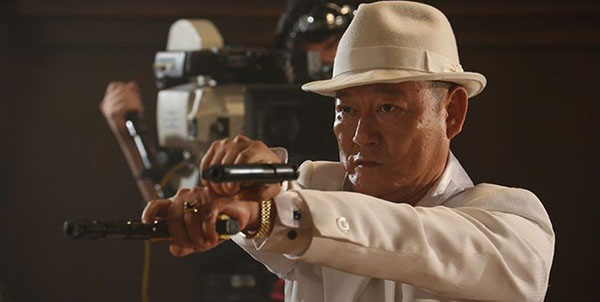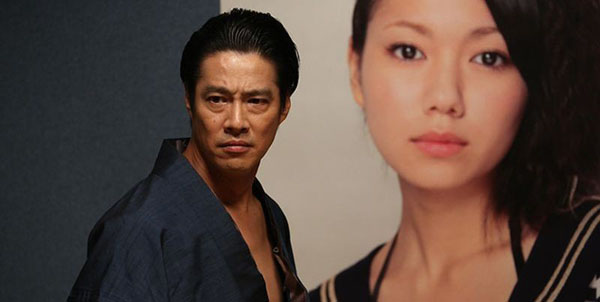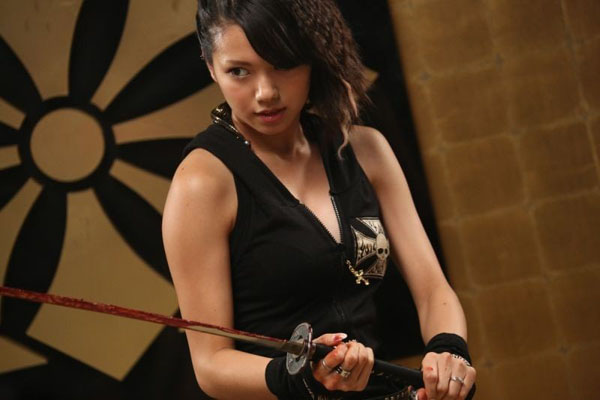“One of the great mysteries of comedy,” begins the Telegraph‘s Robbie Collin, “and perhaps its greatest strength, is that we can enjoy it without understanding why: some of the funniest films ever made don’t so much defy analysis so much as actively resist it. This will come as a great comfort to anyone who tries to parse the new Sion Sono picture Why Don’t You Play In Hell?, in which two rival groups of gangsters agree to slaughter one another on camera for the benefit of a group of wannabe filmmakers, over a decade-long feud partly rooted in a toothpaste advert.”
But for Variety‘s Justin Chang, that “alarmingly catchy toothpaste commercial is the only thing you’ll care to remember from Why Don’t You Play in Hell?, a tedious, over-the-top gorefest that finds prolific Japanese auteur Sion Sono veering into sub-Tarantino B-movie-pastiche territory. Relentlessly jokey, strenuously deranged and conspicuously pleased with itself, this overstuffed yarn about two warring yakuza clans and an amateur filmmaking crew is an empty exercise in carnage maximus. Following last year’s The Land of Hope, a surprisingly sober-minded drama addressing the Fukushima nuclear disaster, Sono has delivered a picture geared exclusively toward his most grindhouse-oriented fans, though even they may leave feeling a bit let down.”
“Part ultra-violent yakuza actioner, part dorky wish-fulfillment comedy in the Kick-Ass vein, both parts cranked extremely loud and incredibly close, Hell ends up playing its contrasting genre trappings against one another,” writes Guy Lodge at In Contention. “Using the semblance of one to deny considered engagement with the other—it’s not really a grisly body-count thriller if it makes you laugh, apparently—Sono covers all his ideological bases by positioning the film as a love letter to cinema. That’s a hackneyed but unimpeachable claim, intended to give it the high ground even when it’s splashing gleefully in the gutter. As such, Hell is populated with eager Sono-surrogate youths brandishing cameras, making knowingly shoddy B-movies-within-B-movies, and bathing in analogue nostalgia. When a standard-issue scene in the film features a young woman filling an antagonist’s mouth with broken glass, then aggressively Frenching him until the shards puncture his cheeks, you have to take your comforts where you can find them.”
“The bright and breezy opening is of the pretty young Mitsuko, who sings and performs a dance in a television toothpaste commercial,” explains Screen‘s Mark Adams, “but her stardom is ruined by a Yakuza attack on her home (her father happens to be a mob boss) that sees her mother jailed for fighting off the attackers with a knife. Ten years later with her mother due for parole Mitsuko (played by Sono’s Himizu star Fumi Nikaido) is starring in a film financed by her father, but she leaves halfway through then shoot to take revenge in a man who abandoned her…. Her father (veteran actor Jun Kunimura, who starred in John Woo’s Hard Boiled) pledges to finish the film for his wife, and by a ridiculously roundabout route ends up recruiting a shrill band of film geeks who call themselves
‘The Fuck Bombers.’ The bloody conclusion sees both Yakuza clans buying into the notion that their epic showdown should be filmed by the nerdy crew, leading to an astonishing—and often very funny—bloodbath of swords, martial arts and machine guns, as hordes die in increasingly bizarre ways.”
“The film’s reputed similarity to Kill Bill is more a question of tone than substance,” writes Deborah Young in the Hollywood Reporter. “One can imagine Quentin Tarantino enjoying the way Sono succeeds in turning silliness into a heartfelt salute to old-fashioned 35mm movie-making, without foregoing a tongue-in-cheek bloodbath that leaves the film set littered with severed limbs and spurting arteries.”
Why Don’t You Play in Hell?‘s screening in the Orizzonti section in Venice and in the Midnight Madness program in Toronto.
Updates, 9/1: “From the off,” writes Oliver Lyttelton at the Playlist, “when things get underway with a pastiche-y James Bond riff, it’s clear that this is Sono’s first entry in, and grand homage to, the action movie world and the references come thick and fast: Hard Boiled, Game of Death, Kill Bill, even Die Hard…. Yet it’s not just some lark, either: the opening scenes, with kids mucking around with Super 8 cameras and improvising dollies with roller skates, are reminiscent of recent filmmaking-themed Bildungsromans like Son of Rambow, Super 8, and even Be Kind Rewind, and, in many ways, the film is Sono’s loving tribute to his profession and vocation…. Mostly, the film’s very funny, Sono displaying a sense of how to frame and time a visual gag that feels positively Zucker-ish.”
“As sour on the movie business as Mulholland Drive (Sono, like Lynch, makes an explicit connection between producing and outright gangsterism), but as deeply in love with the creative side of the medium as the work of Quentin Tarantino, it’s designed as catnip for midnight-movie hounds,” writes Ashley Clark at the House Next Door. “But there’s one nagging irony to the whole endeavor: Despite its openly fetishistic take on 35mm, it’s shot on shiny digital.”
Updates, 9/7: “If another film brings even half the level of lunacy to the Toronto International Film Festival’s Midnight Madness lineup as does Sono Sion’s Why Don’t You Play In Hell?, I will eat my shirt,” promises Twitch editor Todd Brown. “Literally. I will cut up the shirt I am wearing right now—which I quite like, incidentally—I will cook it into a stew, and I will eat it.”
“Quite possibly mankind’s greatest achievement, Sion Sono’s Why Don’t You Play in Hell? is less of a question than it is a glorious grindhouse requiem for an entire mode of filmmaking, and perhaps also Japanese cinema’s formal response to Holy Motors,” suggests David Ehrlich at Film.com. “Sono’s orgiastic kitchen sink fantasia of blood and broken dreams may not have the sweep of his four-hour 2008 masterpiece Love Exposure, but the ecstatic insanity of its final act rivals anything that the aging punk auteur has ever made, which Sono’s acolytes understand is not a compliment to be taken lightly.”
Update, 9/8: Sono “reminds us that cinema is at its most pleasurable when it touches something deep inside,” writes Alexandra Zawia for Cinema Scope. “It might mean literally showing intestines, but that works too.”
Update, 9/11: Pierre Hombrebueno talks with Sono for Twitch.
Update, 9/27: “Even great directors can make turkeys, sometimes without much obvious change in their style or obsessions,” writes Mark Schilling in the Japan Times. “I don’t know that Sion Sono can be described as ‘great,’ though he is among the most interesting and ambitious Japanese directors of his generation. I do know that despite its cool title and wham-bang trailer, his overblown action comedy Jigoku de Naze Warui (Why Don’t You Play in Hell?) is also among his worst films. But then, I found the sequence of endlessly crashing cop cars in The Blues Brothers (1980), celebrated by some as a laugh riot, a total bore.”
2013 Indexes: Venice and Toronto. For news and tips throughout the day every day, follow @KeyframeDaily on Twitter and/or the RSS feed. Get Keyframe Daily in your inbox by signing in at fandor.com/daily.






